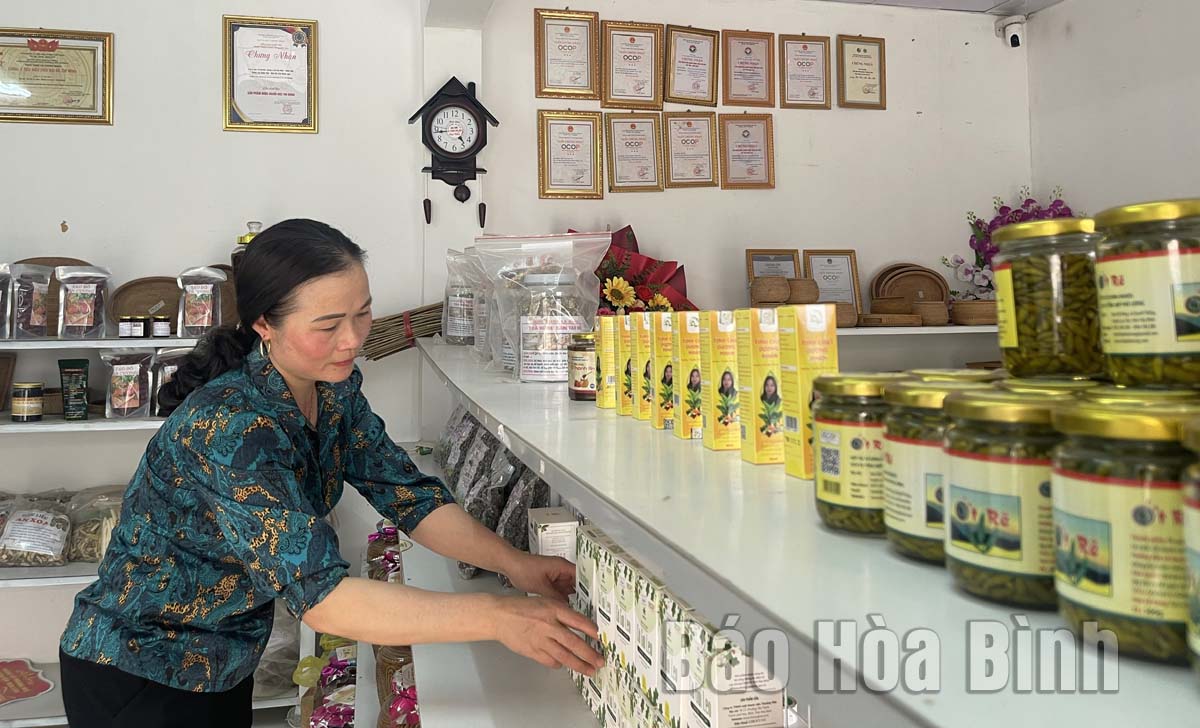
(HBO) – Lac Son district targets to have five products recognised as One Commune –One Product (OCOP) this year besides two products will be re-evaluated. Currently, the district's OCOP products with three stars are Phu Luong forest chili, Luc Nghiep Thanh brocade, Huong Nhuong oranges, vacuum-packed chicken, and "doi” seeds - a local seed to cook with chicken or fish.
Lac Son District People's Committee
directs the construction of booths to display, introduce and sell local OCOP
products.
Among the products proposed to develop into the
district’s OCOP this year is Muong sticky rice wine made by an establishment in
Vu Ban township.
Nguyen Anh Tuan, owner of the establishment,
said to make the product, his family studied the process of making wine with
yeast from plants of the ancient Muong people. Therefore, wine is completely
made from yeast and specialty rice grown in Mien Doi commune. Besides, foreign
wine-making technology is also applied to produce high-quality local wine.
Tuan said that his family received instructions
from departments, agencies, and the People's Committee of Lac Son district to
perfect the wine production process. "We signed contracts with sticky rice
growing households in Mien Doi commune to build a material area for wine
production."
In addition to Muong wine, this year Lac Son
district will continue to include other products in the OCOP programme such as
green-skinned pomelo (Yen Phu commune); sticky rice (Mien Doi commune); Muong
Vang honey and Muong Vang "can” wine (Tan Lap commune).
Phan Thi Hanh, Deputy Head of the district’s
Agriculture and Rural Development Department, said that the district focuses on
supporting standardisation and product development towards producing quality
goods; consulting, guiding those who participate in the OCOP programme in
completing dossiers, registering intellectual property, certifying products
according to safe production standards.
Apart from focusing on developing new products,
the district also pays attention to products that have been evaluated and
ranked to make it continue to meet requirements for export.
The district focuses on coordinating and opening
training courses for managers and administrators of the OCOP programme in
communes, towns, and participants to improve their knowledge and skills in
developing business plans, packaging, labelling, and branding.
The district has built booths to display and
sell OCOP products in the district and other localities. Its specialty products
are also introduced on e-commerce trading floors./.
In Lac Thuy district, communes have been succeeded in promoting their One Commune-One Product (OCOP) products while others are still struggling to position their typical farming products in market. Some communes in the district still fail to have their products met OCOP programme’s requirements, while others have seen their certifications expired.
The inspectorate agency of Hoa Binh province has issued Official Dispatch No. 1090/TTr-PCTN to provincial departments, agencies, localities, business associations, enterprises, and investors regarding measures to improve informal component indexes of the Provincial Competitiveness Index (PCI).
Hoa Binh is taking concrete steps to improve its investment environment, with a strong focus on supporting businesses, settling obstacles for strategic investors, and creating opportunities for robust development in the coming years.
Under the blazing early summer sun, the construction site of Nhuan Trach Industrial Park (IP) in Luong Son district is abuzz with activities from dawn to dusk, a testament to the determination of the investor to meet their construction targets on schedule.



